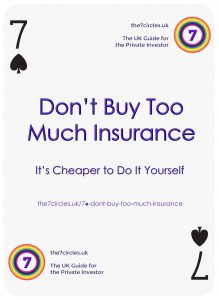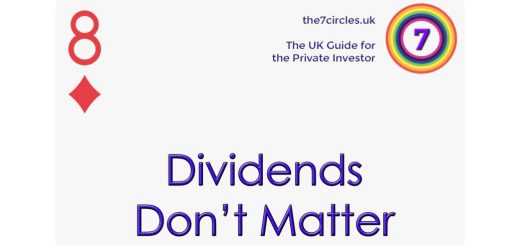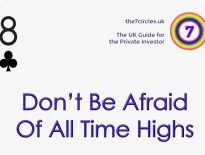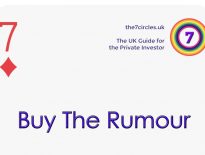7♠ – Don’t Buy Too Much Insurance
Don't buy too much insurance - it's cheaper to do it yourself.
This post is part of the MoneyDeck series, a pack of 52 playing cards that describe 52 “golden rules” for Private Investors in the UK.
Don’t buy too much insurance – it’s cheaper to do it yourself.
Today we’re going to talk about insurance, and in particular, why I think that you don’t need too much of it.
- Yes, the internet has made it much easier to buy insurance, and it’s much more likely that you’re getting a competitive deal (in the sense that the premiums now cluster together much more).
But you can still do better by not buying so much of it.
- You only need insurance for things with a reasonable chance of happening, or with very serious consequences if they do happen.
Before we talk about insurance, we need to talk briefly about risk.
- We’ve come across risk before, as part of our Financial Planning.
When you set out your goals and your current position (via your financial statements) you also need to consider risk.
- You need to work our your attitude to risk (we have a Risk Tolerance questionnaire here) and what that means for the options you have available to you in meeting your goals.
You also need to think about risk when it comes to insurance.
A risk is something that might or might not happen.
- It can be a good thing or a bad thing, but in the case of insurance it’s usually a bad thing.
- Insurers call the bad thing a “loss” – it’s a financial sum that you don’t have any more than the insurance will replace (with limitations).
Risks have two components:
- how likely they are to happen, and
- how serious the consequences will be if they do happen.
The worst things are those that are both likely and serious, but luckily there aren’t many of those in life.
- And we can also ignore the things that are unlikely and not serious (say, a bee sting).
So the main distinction is between unlikely things that are serious (say, your house burning down) and relatively likely things that are not that serious (you denting your car).
There are three ways of dealing with risks:
- accept them
- mitigate them (make them less likely to happen)
- transfer them to others (this is insurance)
So when we use a knife to chop vegetables, we accept the risk that we might cut our finger. (( In practice, most people actually mitigate even minor risks, it’s just the degree to which they take special care ))
- When we cross the road, we look around carefully to mitigate the risk that we might get run over.
- We don’t drive tired or drunk to avoid having an accident.
When it’s too difficult to mitigate the risk, or the consequences are too great to bear, we might want to pay someone to take it away from us.
- That’s where insurance comes in.
Insurance is a great business to be in – if you’re an insurance company.
You get the premiums up front, and you can invest this “float” to earn interest before you have to pay any claims (particularly on longer-term insurance, like life insurance).
- And assuming that you get your maths right – you correctly work out the chances of a policyholder making a claim, and charge enough to cover all the claims – you make a healthy profit most years.
Yes, you have the occasional disaster, but you fund the bad years from the reserve that you’ve built up in the good times.
It’s a rare example of a largely stable, cash flow-positive business.
- Warren Buffett has successfully used it to underpin the dramatic growth of his Berkshire Hathaway conglomerate over the decades.
Older UK readers probably have a slightly different view of insurance.
Most of us can remember the Lloyds “scandal”, when many Names – individual underwriters with unlimited liability for losses – went bankrupt after a year of natural and man-made disasters.
- Some of us will know people who were Names, or may even have been asked about becoming a Name ourselves.
But that’s not regular insurance, it’s reinsurance.
- Lloyds and similar companies (including Berkshire Hathaway these days) are where the regular insurance companies go to lay off any risks they think have become too large. (( In the same way that bookmakers offloads bets with other bookmakers, or directly in the markets in the case of financial bets ))
Regular insurance is much more low risk and predictable.
- Even the Names at Lloyd’s have limited liability protection these days.
In fact, in normal times, I would recommend that you invest in insurance companies – especially pure plays, if you can find them.
- Unfortunately, most insurance companies now diversify into other forms of financial products, diluting their advantage.
- Added to which, the artificially low interest rates we have been suffering for the past seven years limit their profitability, in the same way that they squeeze the spread that banks can make on your money.
So insurance is a good thing for insurers (though it has been better).
- How do things look from our side of the table?
Pretty bad, to be honest.
- You pay someone a chunk of money up front for a year of protection.
- If all goes well, you never see that money again – it’s all profit for the insurance company.
If something goes wrong, you have to jump through a lot of paperwork hoops to get part of your money back (there’s always a deductible or excess payment involved – you can rarely transfer the whole of a risk).
- And if you are successful, you will lose your “no-claims bonus” and your premium for next year’s protection will increase. (( For some risks – eg. flooding – this makes sense, but many of us would argue that after say, a household accident, we’d be less likely to repeat the mistake the following year ))
A much better plan over the long-term is to self-insure – to do it yourself.
- This simply means not taking out insurance, and paying for any losses out of your emergency cash fund.
Over the long-run, you should save the insurance company’s profit margin and expenses (the premium plus the deductibles, minus the claims and expenses).
- This could perhaps be as little as 10%, but is more likely to be 30% on average. (( It can be much higher than this for many kinds of specialised / single-purpose policies, and the unmeasurable level of insurance fraud would also need to be subtracted to work out the cost for genuine claimants ))
And you’ll have a lot less shopping around and claims paperwork to fill in.
An obvious limitation to this approach is that you can’t pay for any losses that are bigger than your emergency fund.
- So big ticket items still need insurance.
In practice, this is likely to just be your buildings (re-building) insurance for your home.
- If you have a mortgage, then your lender will insist on insurance cover as a condition of the loan.
If you live a particularly lavish lifestyle, you might be able to justify contents insurance on the same basis, but this won’t apply to most people.
- Remember, your treasured possessions aren’t worth as much to other people (including your insurance company) as they might be to you.
The other kind of insurance that some people like to have is life insurance.
If you are young and have dependents who rely on your income, this can make sense.
- Term-life insurance (which only covers a specific period of time) is the best-value approach here, but it’s not widely available in the UK.
- Disability insurance can also be useful.
For those with no dependents, or those who are closer to the end of their journey to financial independence, life insurance and disability insurance is a waste of money.
The next category to consider is mandatory insurance.
- Here in the UK, the only type I’m aware of is vehicle insurance.
Even here, you can save money by choosing third-party over comprehensive.
So what types of insurance can you safely ignore?
Here’s a list of the ones I’ve come across – let me know in the comments if I’ve missed anything:
- pet insurance
- travel insurance
- comprehensive car insurance
- protecting your no-claims bonus
- car breakdown / recovery insurance
- rental car collision waivers
- contents insurance
- mobile phone insurance
- extended warranties
- credit card balance insurance (payment protection)
- identity theft insurance
- home breakdown cover (gas, electric and plumbing)
- medical insurance
- personal liability insurance
- long-term care insurance
- flood insurance (if you really need it, it will be prohibitively expensive)
Another thing to look out for is overlaps.
Many insurance policies cover the same things.
- But you won’t be able to claim for the same loss twice, so the second policy is just wasted.
Of course, the more you eliminate insurance from your spending plan, the less likely this is to happen, but it’s worth checking.
The kind of thing I’m talking about is contents insurance (especially for mobile property) that comes bundled with a fancy bank account, or travel insurance included on your home policy.
- People who live in flats should also check that the freeholder / management company doesn’t provide buildings cover for the entire block before shelling out for their own policy.
- There’s also some insurance for purchases made with a credit card, so don’t double up here either.
I hope I’ve managed to persuade you that too much insurance is an expensive folly.
- Insure the big stuff, and the legally required stuff.
You can safely ignore the rest.
- And save 30% in the process.
So remember, Don’t buy too much insurance – it’s cheaper to do it yourself.
Until next time.


















Hi Mike,
I would actually challenge on some of these. For me travel insurance, if you are planning to go overseas outside of the EU (until Brexit…!) then its a must. I always purchase it and have used it in the past. The costs of hospital treatment and extended hotels for an unknown period are most likely more than most people can afford from their emergency fund.
If you arent travelling outside of the UK then I wouldn’t bother!
I would also suggest on the Home Breakdown cover it depends on the circumstances. I dont have it now but I have in the past when I had an older boiler – it worked out at half the price to take the BG Home Care agreement than pay a boiler repair person to come out each time!
I would always encourage people to think twice about insurance that is needed – I am currently insured in case of unemployment, illness and death simply because I don’t want to lose our home. As I progress closer to FI then I will look to drop that insurance as well and reinvest the premiums!
Cheers,
FiL
Thanks for the response.
I think the problem is that you are thinking of a situation where you will actually call on the insurance. That’s a normal psychological protection mechanism to justify your “investment”.
On average, you won’t call on it, and over your lifetime you will save money. It’s not about whether you can fund a particular incident from your emergency fund.
You only need insurance for things that might wipe you out, or are legally compulsory.
The US might well fall into that category, and everyone has to decide for themselves. Not sure I will ever visit there again, so I’ll cross that bridge when I come to it.
Hi Mike,
This is true, but these would have wiped me out and so if I go skiing in the USA or travel around South America or where there is a high cost of repatriation (including dead bodies…!). You are right on average I haven’t called on it, but I also wouldnt travel with out it, potentially psychological but I wouldnt not get that for some of the more remote places.
Europe I wouldn’t bother, but depends on how often and how far you go and for how long!
Cheers
FiL